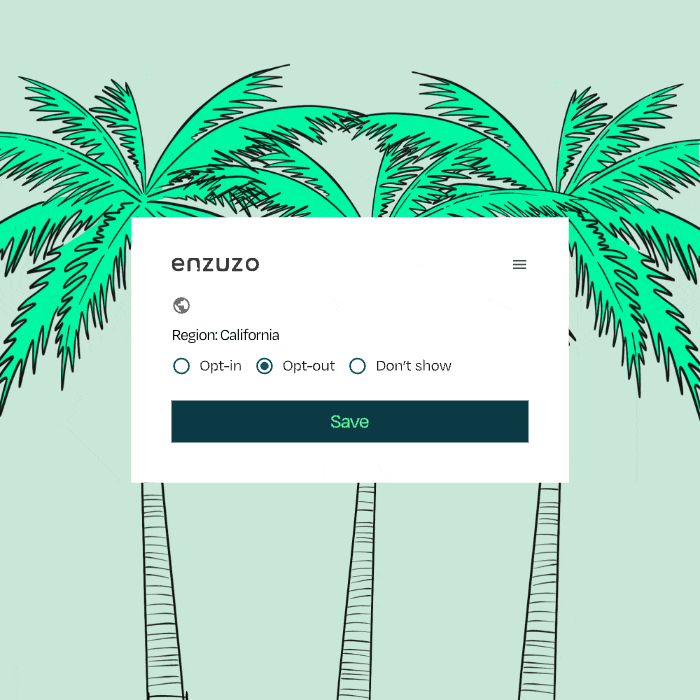"Enzuzo is completely self-serve and easy to use, and very attractively priced relative to competitors."
![]() Emily Wilkinson, Lucy Group
Emily Wilkinson, Lucy Group
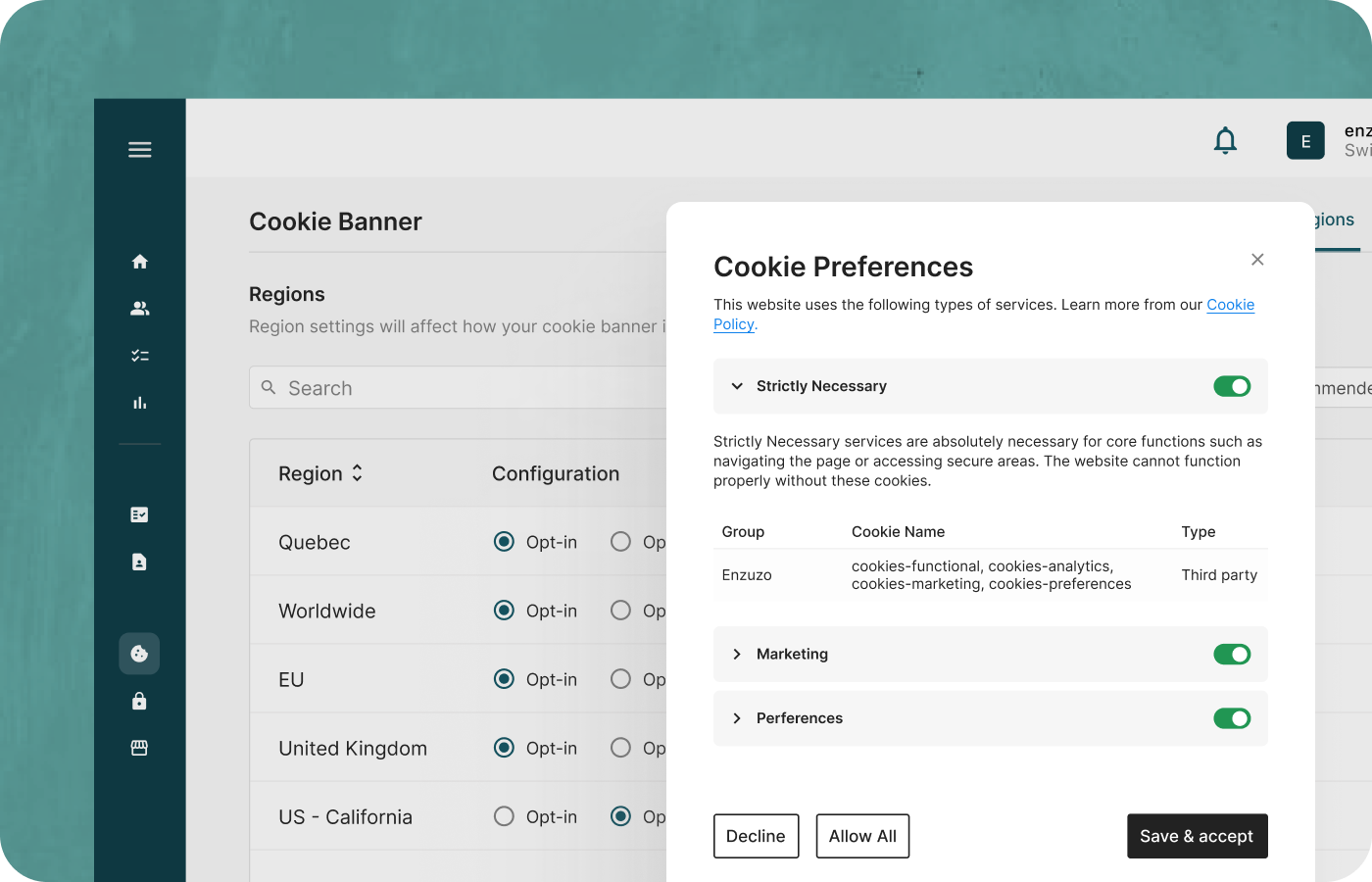
Create a cookie consent manager to comply with opt-In requirements
Build and launch your own GDPR cookie consent banner in minutes. Customize it to meet your brand's text, colours, layout, and configuration.
Allow users to modify their consent preferences.
Include links to your privacy policy.
Record and store consent preferences.
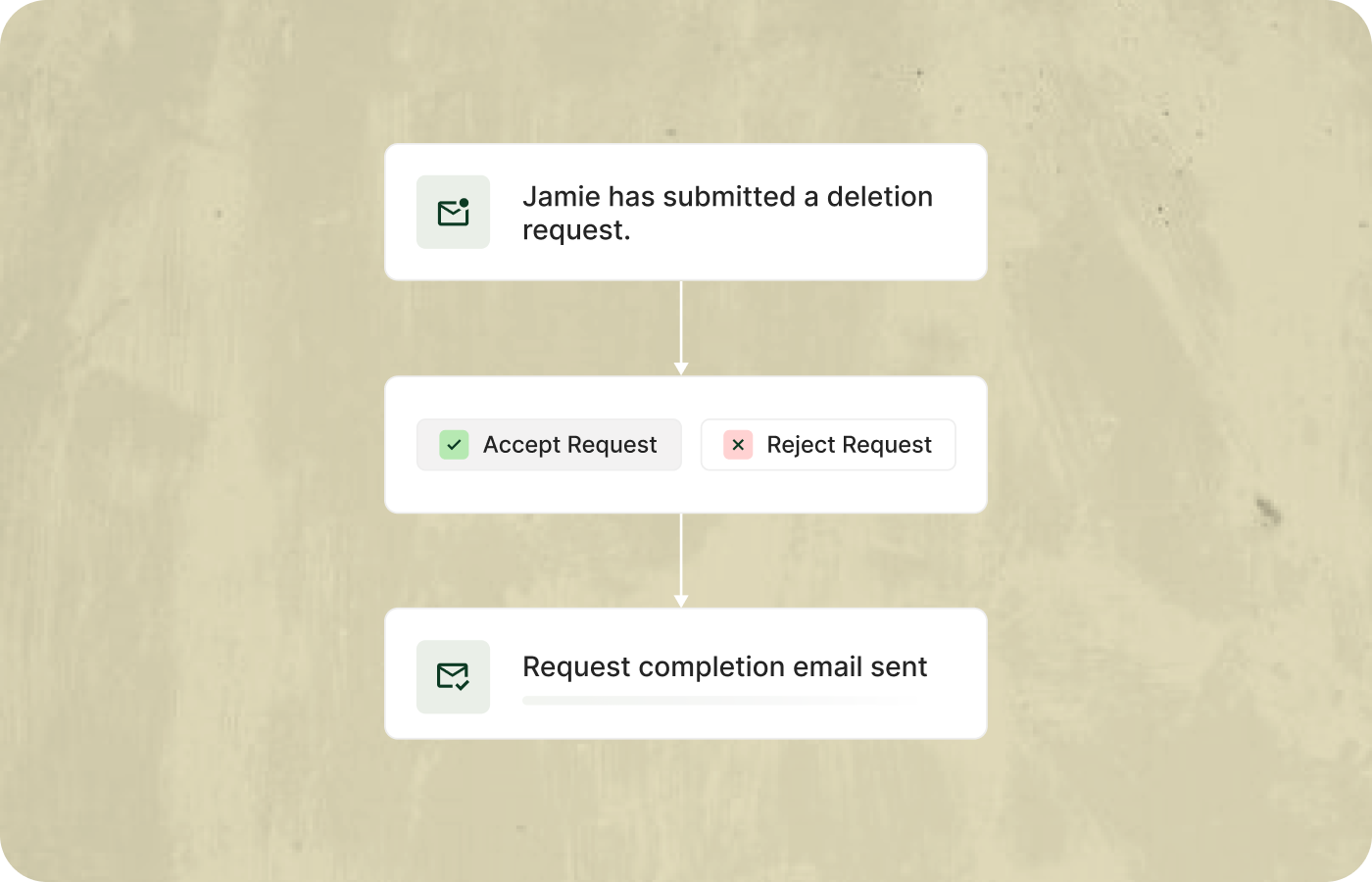
Build Data Subject Access Request workflows to modify personal information
The CCPA mandates businesses comply with requests to access, modify, or delete customer data within 30 days.
Create a "Do Not Sell My Personal Information" page in minutes.
Customers can opt-out or request personal information.
Manage and complete data requests in one place.
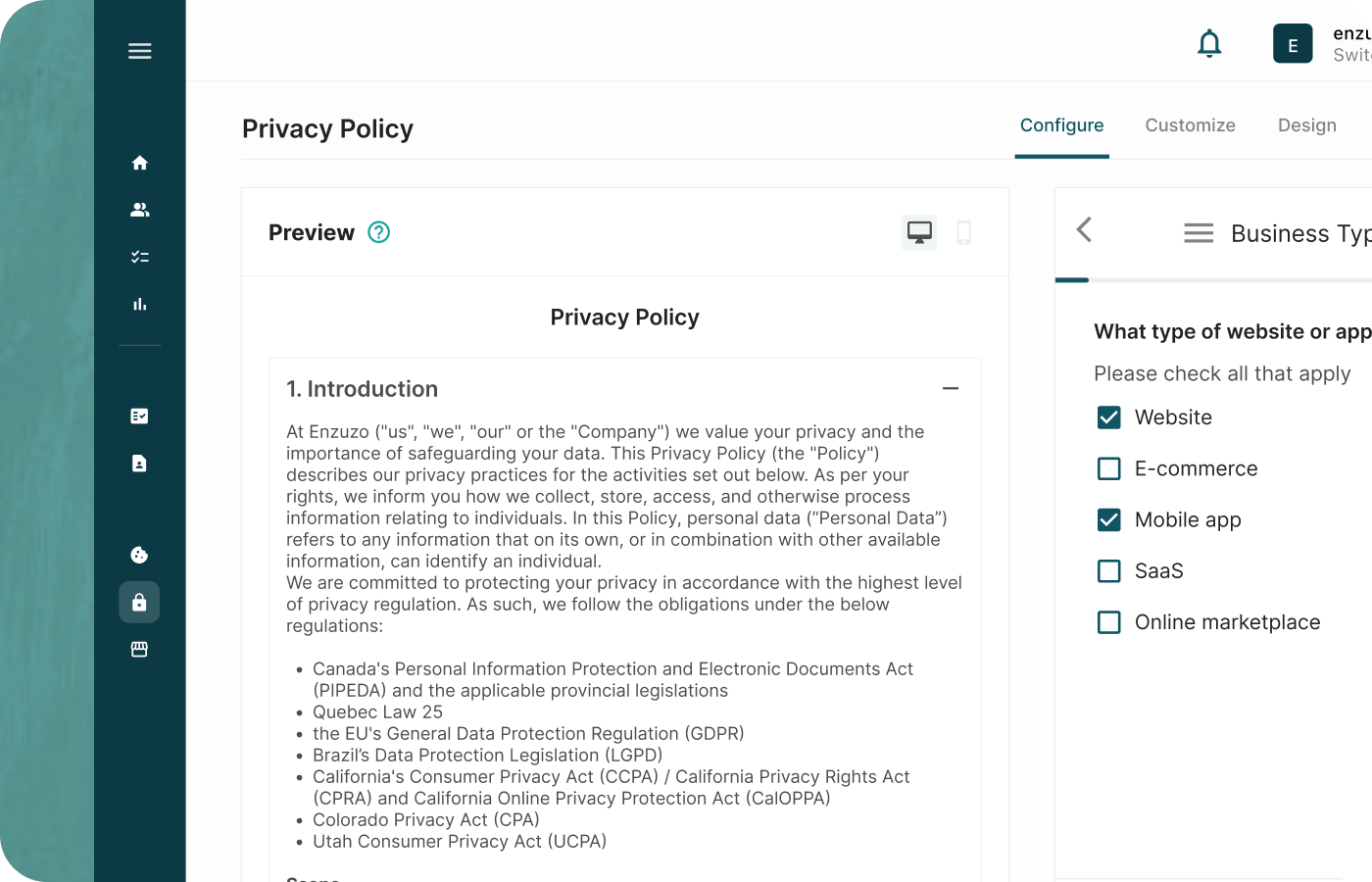
Launch legally-vetted Privacy Policies
Businesses must include specific disclosures in their privacy policy to comply with the CPRA, including consumer rights, the purpose of data collection, and more.
Automatic updates as laws change.
Templates drafted by human lawyers.
Build and launch in minutes.
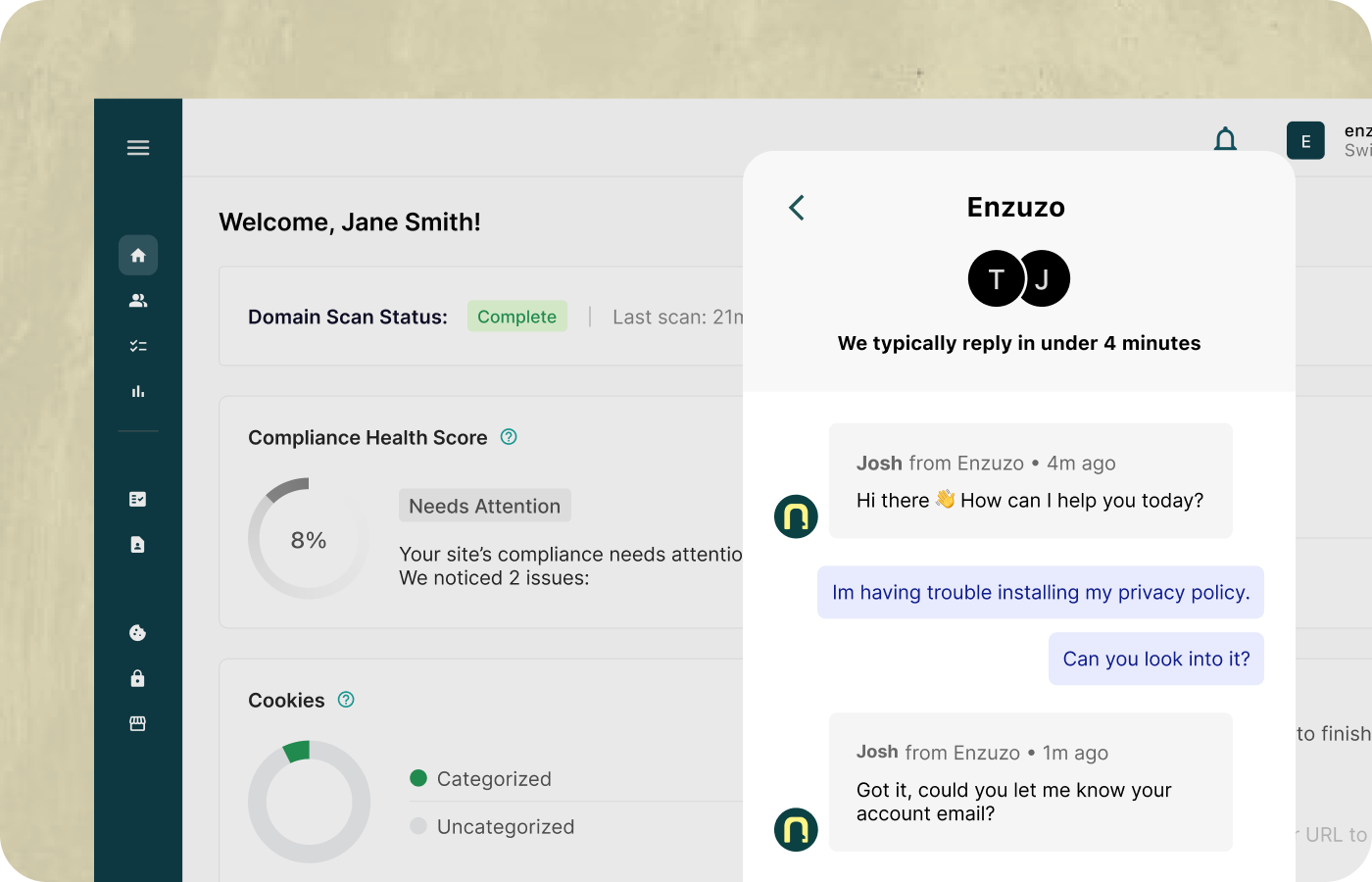
User-friendly interface with priority customer support and onboarding
Enzuzo’s all-in-one intuitive dashboard makes it easy to get started. Complimentary migration from other tools and timely customer support with all plans.
Privacy engineers on call to help with support issues.
Free training and migration from other tools.
Large library of training resources and documentation to help users onboard quickly.
More on CPRA and CCPA compliance
What are CCPA regulations?
The California Consumer Privacy Act (CCPA) is a leading privacy law brought in to offer additional rights and protections for California residents. It gives them greater control over how their personal data is collected, processed, and shared by businesses.
A data subject (or someone making the request on their behalf) doesn’t need to be a customer of your eCommerce store for their request to be valid. They may be a current or ex-employee, corporate partner or sponsor, supplier, contractor, or anyone else that believes you may hold personal data on them.
The best CCPA compliance tools automate these requirements so you can breathe easy.
What are the consumers' rights covered by the CCPA?
There are 5 different "rights" within the California Consumer Privacy Act in which you must abide by if you are collecting personal information of customers' who reside in California.
- Right to notice
- Right to disclosure
- Right to opt-out
- Right to fair treatment
- Right to request deletion
Learn more about each of these rights in our Simple Guide to CCPA.
Do I need a Do Not Sell My Information page for my website?
If you sell to customers who live in California than it's a great idea to create and launch a Do Not Sell My Info or California Privacy Rights page for your website. Alternatively you can list more information about CCPA in your privacy policy if you don't want to have a standalone page.
The most important thing, is that you have an easy way for customers to submit data subject access requests, so you can comply with the Right to Disclosure, the Right to Opt-Out and the Right to Request Deletion.
What is the penalty for noncompliance with the CCPA?
The Attorney General has the opportunity to impose injunctions and civil penalties on businesses for noncompliance and CCPA violations.
This penalty is set at $2,500 for each violation, which can rise towards $7,500 per violation if it was considered to be intentional. These penalties are applied per violation. This means if your violation refers to hundreds or thousands of individuals, the penalty can rise steeply.
What is a Data Subject Access Request (DSAR)?
The phrase “data subject access request” might sound complicated and technical, but when you strip it back a DSAR is simply a request from someone that you hold personal data on. They’re known as the data subject, and often want to access their data, hence the term data subject access request.
How do you get a CCPA compliance certificate?
The California Consumer Privacy Act (CCPA) was passed by the California State Legislature and signed into law by the Governor of California, Jerry Brown, on June 28, 2018. This act was meant to amend part 4 of Division 3 of the California Civil Code. The act stipulates that California residents have a right to know what personal data is being collected about them and how it’s being used.
Therefore, organizations are mandated to respond to personal data requests submitted to them by consumers. This law applies to all businesses in California, including for-profit entities that collect consumers personal information. But for your organization to qualify for CCPA compliance, it has to meet the following criteria:
- Annual gross revenue of over $25 million
- Ability to buy, receive, or sell personal data of over 50,000 consumers or households
- More than half of its annual revenue is earned from selling personal consumer data
You also need to check if your organization is covered under the privacy act so that you can prepare for its compliance. To check for CCPA compliance, follow these steps:
- Understand your responsibility to the act
- Map your consumer data
- Update your privacy disclosures
- Come up with a homepage privacy link
- Figure out the best way to handle consumer personal data requests
- Identify and implement the necessary system changes
- Train your employees
- Strengthen your data security
How can CCPA software help your business?
Under the CCPA, your business is supposed to routinely implement new data privacy systems and policies to ensure the personal data of every consumer is fully protected. This act also extends the meaning of personal information to include data elements that weren’t previously considered personal data under any law in the United States. Failure to comply with this act results in hefty fines and the risk of being prosecuted by the consumer for violation of their privacy.
One of the best solutions to this problem is the use of data privacy compliance software. This program helps you with CCPA privacy compliance by enabling you to perform important functions like risk management reporting, compliance privacy audit, analytics privacy compliance, and other critical tasks related to data privacy compliance. Here are the main benefits of CCPA software for your business:
- Provides you with a compliance framework with the necessary tools and controls to get started
- Allows you to rapidly collect evidence to show your efforts toward compliance
- Enables you to work with the productivity tools and solutions you already have
- Allows you to re-use evidence across various compliance frameworks and controls
- Gives you the ability to plan control to various regulatory standards, and reduces the time for compliance with all regulations that affect your business
- Pinpoints & prioritizes your important operations to ensure timely compliance
Do you have a CCPA compliance checklist?
Yes, our CCPA requirements checklist can be found at our data privacy compliance page.
The page includes a CCPA audit checklist and advises you of the necessary legal pages for your business to be compliant with CCPA.
Still have questions about Enzuzo? Visit the Help Center.




